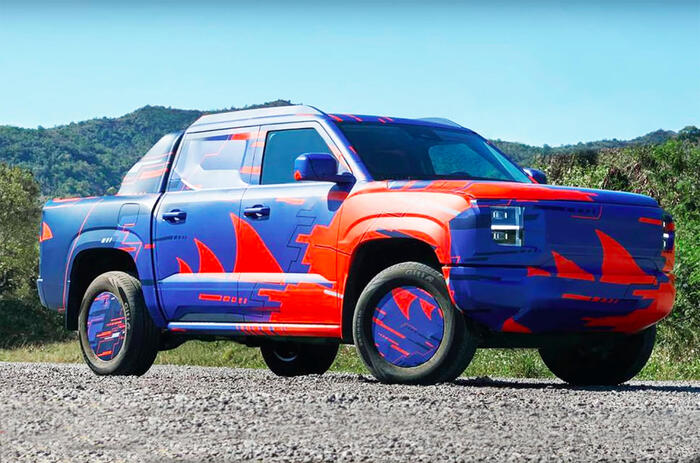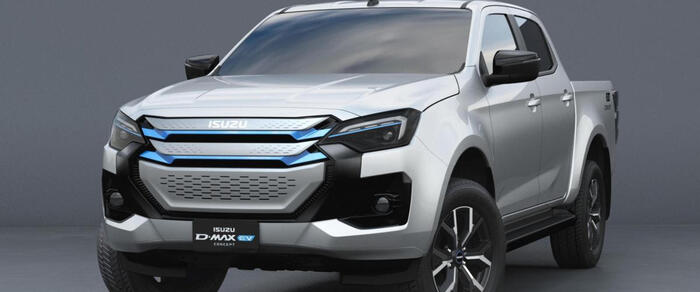Enlarge image
GM boss Mary Barra with the new electric pick-up Chevrolet Silverado EV
Photo:
Steve Fecht / Chevrolet
Mary Barra held out her audience for an excruciatingly long 22 minutes.
The head of General Motors (GM) was only virtually at the high-tech trade fair CES in Las Vegas, in fact, she was standing in a glittering television studio setting at the headquarters of the US car manufacturer in Detroit.
After lengthy commercials of the type "The future begins today", the star of the day finally rolled onto the stage: the Chevrolet Silverado EV, all in dark blue.
The car should save GM into the electric age from next year.
The first attempts with the plug-in hybrid Volt and the small car Bolt have not yet brought about the breakthrough.
The Silverado pick-up truck, meanwhile, is one of the American auto icons.
For ages it has been one of the best-selling models, for a long time only surpassed by another pick-up, the Ford F-150.
It has been at the top of the registration statistics for more than four decades.
Nowhere else are more of these vehicles registered than in the USA.
In December alone there were 220,000, in the whole of last year it was 2.3 million.
Originally designed as a cheap delivery donkey, it is not only farmers and construction workers who have long been driving the small trucks, which have become larger, heavier and more popular over time.
Five of the ten best-selling models in the US are pick-ups. In 2020, more pickups and SUVs were sold than all other cars combined. The US carbon footprint is devastating not least because of the fuel guzzlers, also because gasoline is cheap in most states. The USA emits more CO₂ to China than any other country, and per capita emissions are twice as high as in the People's Republic.
As in Germany, traffic is one of the main problems for the climate.
No other sector produces as many emissions and they are difficult to reduce.
Americans want to know even less about higher fuel prices and waiver than Germans.
At the same time, the auto industry is still lagging behind.
Beyond Tesla, whose models appeal more to lifestyle customers, too little has happened for a long time.
Other start-ups such as Fisker are flagging, the traditional mass manufacturers GM, Ford and Chrysler are late.
Similar to the German competition, they are now starting to catch up, pulling up battery factories and bringing one electric model after the other onto the market.
California, where half as many people live as in Germany, has already announced an end to cars with internal combustion engines.
President Joe Biden and his Secretary of Transportation Pete Buttigieg are making billions available for building a nationwide charging network and tightening climate targets for car traffic.
By 2030, half of all cars sold should be electric.
This is hardly possible without electric pick-ups.
Climate protection is not a selling point
The manufacturers seem willing, but the question remains: can there be enough buyers for the e-trucks in the down-to-earth milieu?
So far, people from liberal circles, where climate protection is an important issue, have been interested in electric cars in the USA.
The largest market for the small trucks are the conservative states.
Surveys show that there is great skepticism towards electromobility and that few people are interested in the climate-friendliness criterion when buying a car.
GM boss Barra and the product manager responsible for the Silverado EV, Nicole Kraatz, largely dispensed with air conditioning during the presentation and quickly got to the practical side of the car.
An e-pick-up does as much as traditional small trucks, according to the message, but offers new features that are only possible with electric cars.
Pulling a boat trailer or caravan - no problem.
The six-meter-long Silverado can tow a load of five tons behind it.
400 miles range, a good 640 kilometers, is the optimistic promise.
In ten minutes of quick charging, the battery should get enough power for 100 miles.
GM cooperates nationwide with almost a dozen charging station operators.
In addition, ten sockets on the car provide electricity.
This can be used to supply the electric grill, tools on construction sites, other e-cars or entire houses when camping.
After the start of sales in spring 2023, there will be a premium version for a six-figure sum and an entry-level version as a workhorse for the equivalent of 35,000 euros.
A lot of car for little money, that was always the pick-up promise.
“GM, Ford and Chrysler (RAM) know the pick-up buyers very well.
The electrical platforms offer them enormous opportunities to transform pick-ups and vans into mobile work devices, with a massive power supply on site and independent of the network, ”said Joe Philippi, industry veteran and head of Autotrends Consulting.
Tesla and Rivian would rather target a recreational target group.
Regular customers are (still) skeptical
Formerly than GM, Ford wants to sell its electrified F-150.
The manufacturer collected 200,000 pre-orders and announced a few days ago that it would double its targeted annual production.
At Ford, too, climate protection plays a subordinate role in US marketing.
"The climate advantages in this segment are not in the foreground for most buyers, which is why the marketers do not advertise this," observes Philippi.
The electric pickup was designed for "people who do real work," said Ted Cannis, head of Ford's commercial customer business, at a Reuters auto conference.
The focus is on practical use for everyone who transports a lot.
However, corporate customers still reacted skeptically, Cannis recently admitted.
With electric delivery vans, the operators could save costs for fuel and maintenance, but the "worry about the unknown", for example with a view to the charging network, makes many hesitate.
According to Ford, three out of four of the pre-orders come not from regular customers, but from new customers.
Despite all the euphoria among the manufacturers, many pick-up traditionalists will be difficult to convince at first, says Jeff Schuster from the management consultancy LMC Automotive.
"It is mostly about buyers who are not only loyal to the brands, but also to engines," said the analyst for the AP news agency.
"Younger users in particular, who like the macho aura of the roaring exhaust, are unlikely to be won over," says industry expert Philippi.
The electric pick-up offensive by the traditional manufacturer from Detroit is a sign that electric mobility is also becoming mainstream in the USA, but this does not happen overnight.
Despite Tesla, electric cars made up just 3.2 percent of vehicles sold in the U.S. last year.
By 2025, Schuster only predicts an increase to just under 13 percent.
If his prognosis is correct, even towards the end of the decade, climate-damaging combustion engines would still make up the majority of new cars in the USA.














